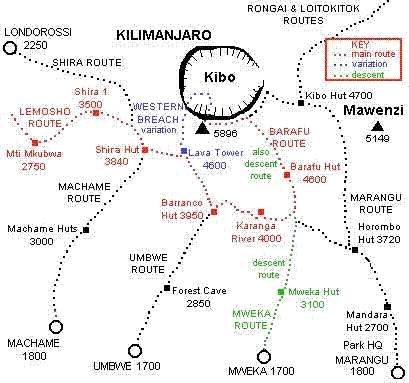The Rongai route on Mount Kilimanjaro is seven days and camping only, this route is regarded as a lower traffic and easier route compared to those on the southern slopes. It's advantages are a more gradual ascent in terms of terrain which allows for excellent acclimatisation plus we include an additional days acclimatisation so you can enjoy the stunning scenery from Mawenzi camp. The days are shorter and less demanding on the Rongai route.
It takes five days ascending through the forest, onto the heathland and to the summit coming from the NNE side of the mountain and after summiting there are two days of descent and exit through Mweka Gate on day seven. The trip is a great opportunity to see diverse vegetation and wide-eyed views especially from higher camps.
The Rongai Route is a camping trip for an average group size of 8 (we can take up to a maximum of 25 people but this is usually only for organised private groups; most team sizes are 6 - 8 people) using top quality mountain tents, comfortable mattresses, and qualified guides who work with us full time, porters who carry the bags and equipment, and cooks who provide fresh, tasty food every day. The ratio of guide:climber is 1:4.

Upon arrival at Kilimanjaro airport, you will be greeted by our representative who will accompany you to the hotel in Moshi for an orientation on your trek. Your guides will be there to provide you with details on your trek and will also check your trekking gears.
After an early breakfast in Moshi, drive to the Rongai Gate near the Kenya border. After registering at the gate, begin your climb to Uhuru Peak, the roof of Africa. During the first day, hike through forests where you may see and hear wildlife. Eat lunch on the trail before continuing to the first campsite. Rongai ascends via the less forested northern side of the mountain.
Rongai Route is one of the least crowded routes on Kilimanjaro because of the long drive to the gate. The Rongai trail is thought to have the best chance of viewing wildlife.
During day two hike through Kilimanjaro's moorland. The Rongai route is relatively short and steep, making for shorter hiking times. During this day, view Mawenzi Peak ahead
This day is an acclimatization day, allowing you to hike in the beginning of the day and rest in the afternoon and evening. The hike is relatively short but steep. The Mawenzi Tarn campsite is situated below Mawenzi Peak and offers stunning views of both Mawenzi and Kibo.
Day four is an acclimatization day at Mawenzi Tarn. We advise hiking a bit higher this day before returning to Mawenzi Tarn in the afternoon.
Cross the lunar landscape of the saddle on this day to arrive at the final campsite. Kibo Camp is situated directly below the Kibo cone, giving you views of your final destination.
Around midnight, begin the final ascent to Uhuru Peak, the highest point in Africa. For the next six hours, hike by the light of your flashlight. The ascent to the crater rim is the most challenging part of the entire trek. The trail is very steep until you reach the crater rim at Gilman's Point.
The hike from Gilman's to Uhuru Peak is a gradual climb and, as far as hikes go, not very difficult. The altitude, however, makes the hike long and tiring. The crater rim hike takes approximately two hours. Upon reaching Uhuru, take photos of your guide and group at the peak before beginning the descent to Horombo Hut.
After breakfast, finish the trek with a descent to Marangu Gate. Your last hike on Kilimanjaro is a beautiful one, passing through Kilimanjaro's cloud forest. Watch your step during the descent, as the trail can be slippery. Our vehicles will be waiting at Marangu Gate to take you back to Moshi/Arusha. You will be able to buy t-shirts and sodas at the gate.
» Private transport from the hotel to the Park s gate (starting point for the climb)
» All National Park entry fees
» All camping fees
» 2 night's hotel the night before and the night after the climb, with breakfast included
» Hut fees [ Marangu route]
» Friendly and competent Trained Mountain Guides, assistant guides, porters and professional cooks.
» 3 full fresh meals daily. We provide fresh food on the mountain in plentiful and well prepared by skilled professional cooks(we also consider your choice of food that you would prefer -Vegetarian and Non Vegetarian). Menu especially designed for climbers.
» Hot drinks on the mountain and Hot water for washing will be provide everyday on the mountain.
» Quality specious tents, sleeping mats, camping tables ,camping chairs and Mess/Dining Tent.
» Kilimanjaro National Park certificate for your successful summit attempt
» Qualified medical guides
» Breakfast, lunch and dinner, as well as hot drinks on the mountain
» Salaries for Guides, cook and porters.
» Rescue fees (Kilimanjaro Park rescue team fees)
» Government taxes
» Pickup and drop off to Airport
» Evacuation services
» Supplementary Portable Oxygen and Complete First Aid Kit (used in case of emergency only)
» ulse oxy-meter carried by all chief guides
» 3-4 liters of mineral/treated water (per Climber) provided daily during the climb
» Portable toilet available at an additional cost (There are public toilets on the mountain)